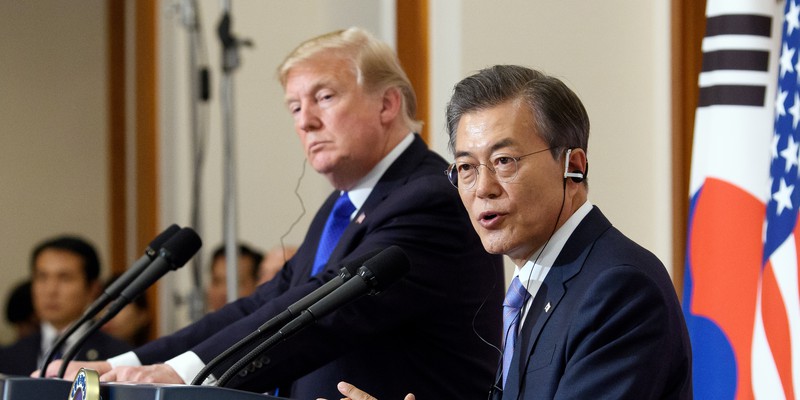Trump Doesn't Deserve a Nobel Prize—but Moon Jae-in Might

In recent months, there has been much talk about the possibility of Donald Trump receiving a Nobel Peace Prize for broaching North Korean denuclearization and pursuing peace on the Korean Peninsula. In February, it was reported that the Norwegian Nobel Committee had discovered not one but two forged nominations for President Trump. But since then, a group of House Republicans has officially nominated Trump for a Peace Prize. Trump’s supporters even chanted “Nobel” at one of his campaign rallies recently.
South Korean President Moon Jae-in, the other major political actor in inter-Korean dialogue right now, has already thrown his support behind the prospect of Trump becoming a Nobel laureate. Clever though it may be for Moon to appear humble and deflect credit to his more egocentric ally, awarding Trump a Nobel Peace Prize would be a grave mistake, a ‘spur-of-the-moment’ decision ignorant of recent history. The political track records of Trump and Moon actually indicate that Moon, not Trump, would be more deserving of a Nobel Peace Prize for his efforts to reconnect with North Korea and its leader, Kim Jong-un.
In his will, Alfred Nobel stipulated that the Peace Prize is to be awarded to “the person who shall have done the most or the best work for fraternity between nations, for the abolition or reduction of standing armies and for the holding and promotion of peace congresses.” Even though Trump has been working towards peace with North Korea in 2018, he began his tenure in office by wildly heightening tensions on the peninsula. Most famously, he threatened to rain “fire and fury” on Kim Jong-un’s regime should it continue to threaten the United States and its allies—hardly the rhetoric of a Peace Prize recipient.
The House Republicans who nominated Trump argue that “although North Korea has evaded demands from the international community to cease its aggression for decades, President Trump’s peace through strength policies are working and bringing peace to the Korean Peninsula.” Their argument refrains from considering the entire picture of Trump’s impact on the North Korean situation, only the positives. Trump’s crazed rhetoric originally had a highly negative effect on the peninsula: the South Korean public became increasingly afraid of the possible consequences of his behavior, and Kim Jong-un fired missiles over Japan in late 2017. To suggest that Trump’s unconventional approach has been purely beneficial for the Korean peace process is to discount his destabilizing influence only a year ago.
The House Republicans add that they “can think of no one more deserving of the Committee’s recognition in 2019 than President Trump for his tireless work to bring peace to our world.” Their pronounced amnesia on Trump’s track record is coupled with an omittance of Moon’s active role in the peace process: they only refer to Moon’s support for Trump. Moon has been working towards inter-Korean peace his entire life. The son of refugees from North Korea and a former civil and human rights activist, Moon was elected South Korea’s leader barely over a year ago. He promised to re-engage earnestly with North Korea, pursue denuclearization of the whole peninsula, and meet with Kim Jong-un directly should the opportunity present itself. Moon has been living up to all those promises since then.
In fact, the Winter Olympics in South Korea was the turning point for this newfound inter-Korean dialogue. Moon’s government went to great lengths to accommodate North Korea’s presence at Pyeongchang on relatively short notice. The United States, while involved in the geopolitics at play under the Olympics’ surface, was not the primary driving force behind the North’s participation. Shortly after the Olympics, the two Koreas rapidly escalated their talks, which then led to Kim Jong-un declaring himself open to meeting with Trump. Moon shouldered the burden of communicating with the North, and his government deserves the lion’s share of the credit for moving the peace process forward.
Just because Trump is the leader of the most powerful democratic nation on earth does not make him the center of the events transpiring on the Korean Peninsula right now. The truth is that Moon is more responsible for fostering inter-Korean cooperation than Trump. In fact, Trump’s potential meeting with Kim is already being thrown into doubt—and Trump is still deliberately threatening Kim’s regime, this time with “total decimation.” On the other side of the Pacific, Moon has already made good on his campaign promises and is moving to finally end the Korean War after his historic summit with Kim in April.
Current events are still taking shape between the two Koreas, and no Peace Prize should be awarded prematurely. But when stacking up and comparing their resumes based on the criteria outlined by Alfred Nobel, Moon is clearly more deserving of being nominated to become a Nobel laureate than President Trump. The selection process is extremely secretive, so the international community is unlikely to hear much about a potential 2018 laureate until the result is announced. In any case, the entire world is fortunate that the leader of South Korea is intently focused on extending goodwill to his northern counterparts—and is already backing up his talk with real action.
The image featured in this article is used under the Creative Commons 2.0 license. It is the work of the Korean Culture and Information Service; the original can be found here.